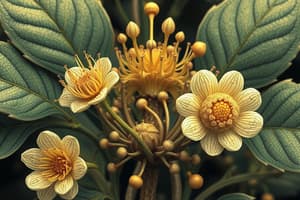Podcast
Questions and Answers
What pigments are found in organisms belonging to Kingdom Plantae?
What pigments are found in organisms belonging to Kingdom Plantae?
- Chlorophyll a & c, carotenes and phycobilins
- Chlorophyll c & d, phycobilins and fucoxanthin
- Chlorophyll a & b, carotenes and xanthophylls (correct)
- Chlorophyll b & d, carotenes and fucoxanthin
What is the primary mode of reproduction in Kingdom Plantae?
What is the primary mode of reproduction in Kingdom Plantae?
- Asexual reproduction
- Budding
- Fragmentation
- Sexual reproduction (correct)
What is the defining characteristic of non-vascular seedless plants in Kingdom Plantae?
What is the defining characteristic of non-vascular seedless plants in Kingdom Plantae?
- Lack of conducting tissues (xylem and phloem) (correct)
- Dependence on water for reproduction
- Presence of specialized water-conducting tissues
- Ability to produce seeds
What is the role of organisms in Kingdom Plantae in the ecosystem?
What is the role of organisms in Kingdom Plantae in the ecosystem?
What distinguishes organisms in Kingdom Plantae from those in Kingdom Protista?
What distinguishes organisms in Kingdom Plantae from those in Kingdom Protista?
Flashcards are hidden until you start studying
Study Notes
Characteristics of Kingdom Plantae
- Chlorophyll a and other accessory pigments such as chlorophyll b, carotenoids, and phycobiliproteins are found in organisms belonging to Kingdom Plantae.
Reproduction in Kingdom Plantae
- The primary mode of reproduction in Kingdom Plantae is by producing seeds, including flowering, pollination, and fertilization.
Characteristics of Non-Vascular Seedless Plants
- Non-vascular seedless plants, also known as bryophytes, are characterized by the absence of vascular tissues and the production of spores instead of seeds.
Role of Kingdom Plantae in Ecosystem
- Organisms in Kingdom Plantae play a crucial role in the ecosystem as primary producers, converting sunlight into organic compounds through photosynthesis, and serving as a food source for heterotrophic organisms.
Distinctive Features of Kingdom Plantae
- Organisms in Kingdom Plantae are distinguished from those in Kingdom Protista by their ability to perform photosynthesis, possession of cell walls composed of cellulose, and the presence of chloroplasts containing chlorophyll a.
Studying That Suits You
Use AI to generate personalized quizzes and flashcards to suit your learning preferences.



